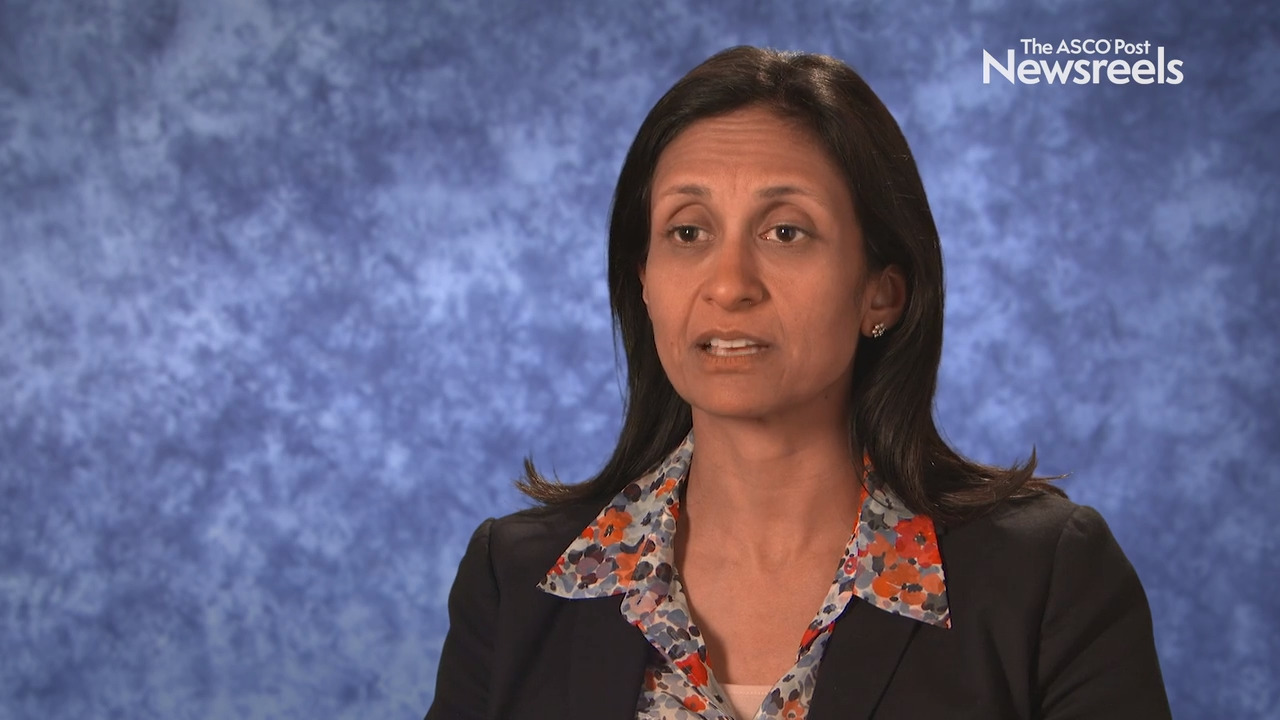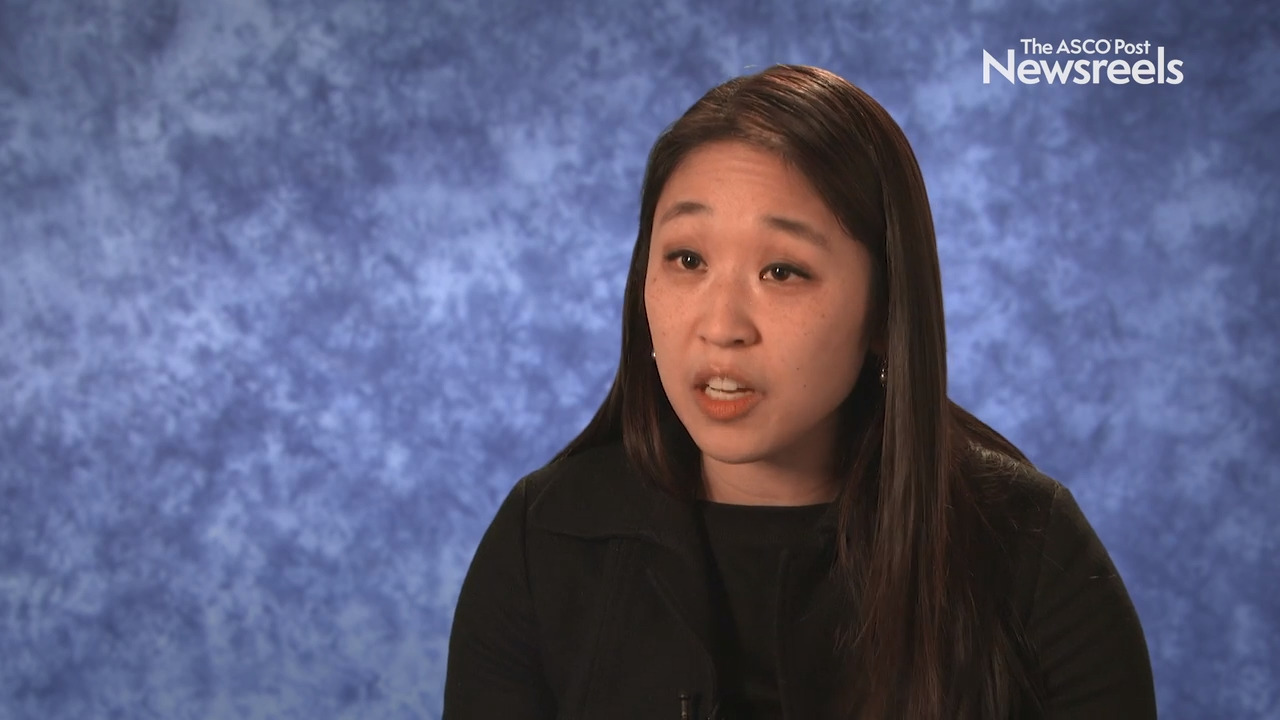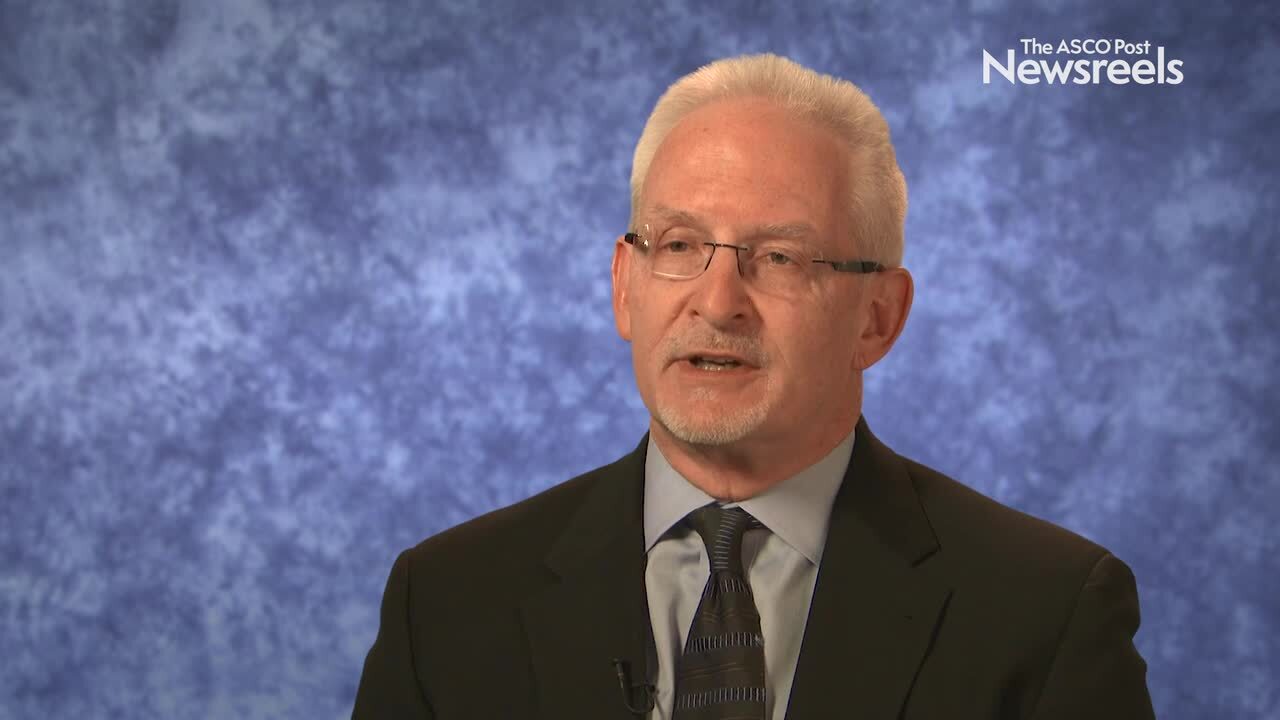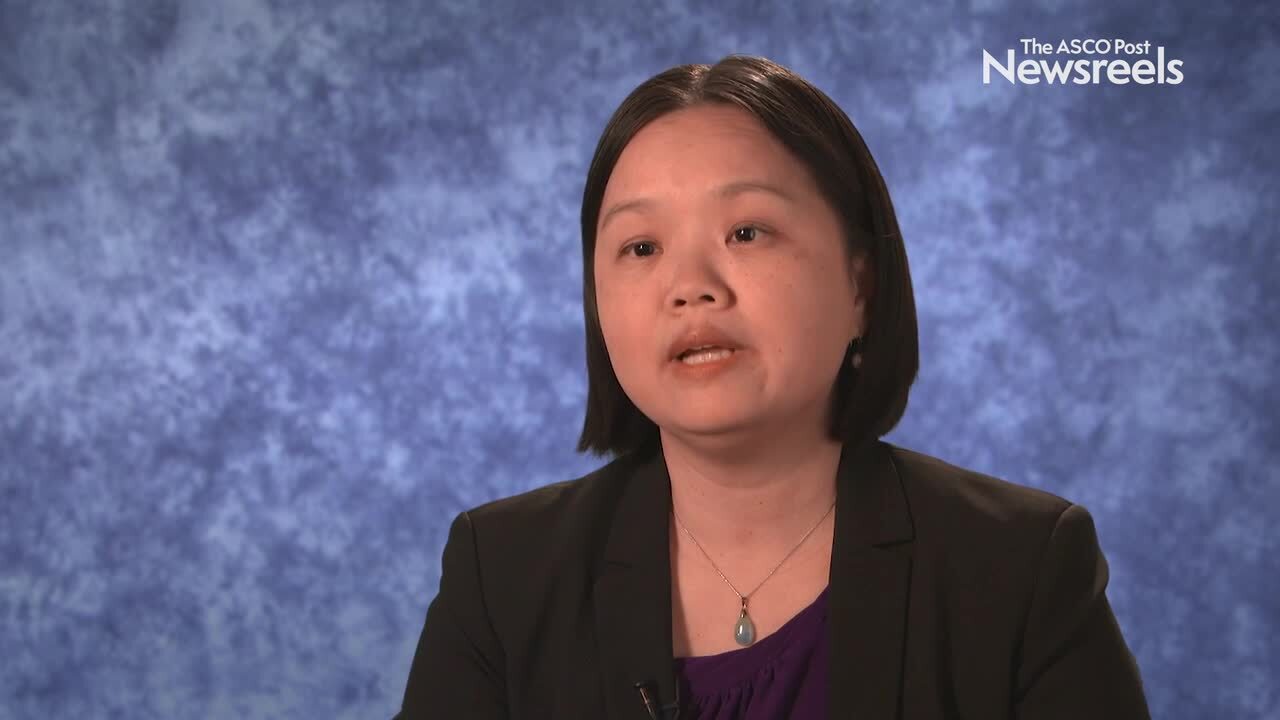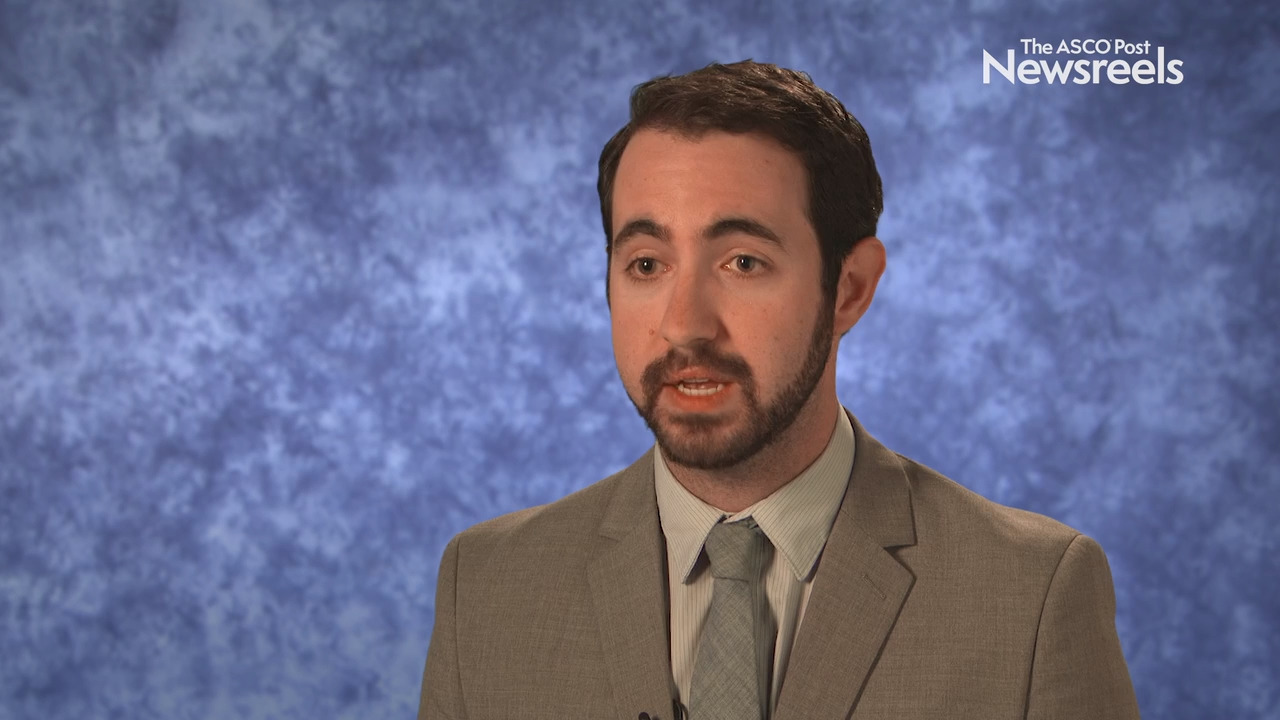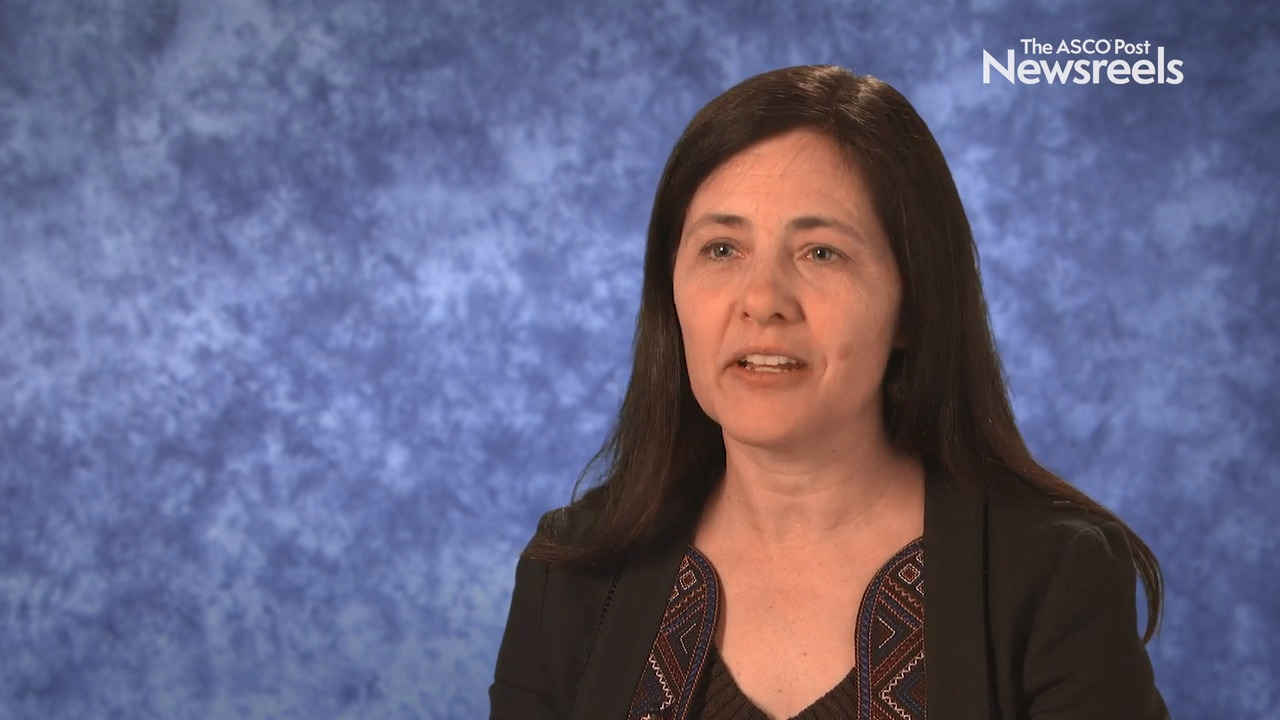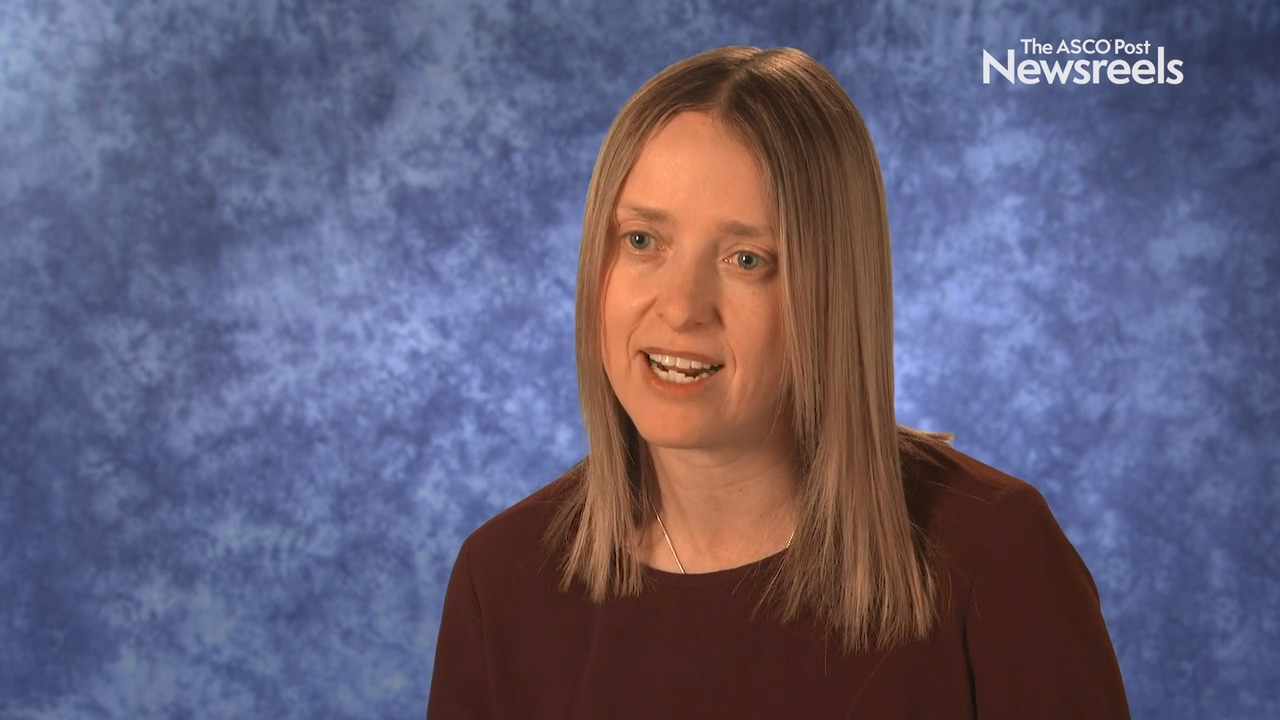Lifetime Risk of Brain Metastases in Elderly Survivors of Breast, Lung, and Skin Cancers
Elderly survivors of breast cancer, lung cancer, and melanoma face risk of brain metastasis later in life, and may require extra surveillance in the years following initial cancer treatment, according to results of a study published by Ascha et al in Cancer Epidemiology, Biomarkers, &...
Pembrolizumab as Third-Line Option for Extensive-Stage Small Cell Lung Cancer
USE OF the anti–programmed cell death protein 1 (anti–PD-1) checkpoint inhibitor pembrolizumab after two or more prior lines of therapy led to responses in patients with advanced small cell lung cancer (SCLC) in a pooled analysis of two clinical trials: phase Ib KEYNOTE-028 and phase II...
Expert Point of View: Roy S. Herbst, MD, PhD
FORMAL STUDY discussant, Roy S. Herbst, MD, PhD, Chief of Medical Oncology at the Yale Cancer Center, New Haven, Connecticut, stated that the findings of the TATTON analyses are “compelling,” and the combination of osimertinib plus savolitinib can be considered a “win,” although randomized trials...
Osimertinib Plus Savolitinib in Advanced NSCLC Driven by MET Resistance
THE ADDITION of the MET inhibitor savolitinib to the EGFR inhibitor osimertinib led to activity in patients with MET-amplified, EGFR-mutated non–small lung cancer (NSCLC) with acquired resistance to previous therapies, according to interim results from two expansion cohorts of a phase Ib clinical...
Association Between Clinical Outcomes and Patient Characteristics/Genomic Profiles in Lung Cancer
As reported in JAMA, Singal et al used a clinicogenomic database in routine clinical practice to identify associations between treatment outcomes and patient characteristics or tumor genomic profiles in the setting of non–small cell lung cancer (NSCLC). The study cohort of 4,064 patients...
ESTRO 38: Radical Hemithoracic Therapy in Patients With Mesothelioma
Patients with mesothelioma are twice as likely to survive for 2 years or longer if they are treated with a high dose of radiation to the affected side of the trunk, according to research presented by Minatel et al at ESTRO 38, the annual congress of the European Society for Radiotherapy...
Survey Finds Rates of Physician-Patient Discussions About Lung Cancer Screening Are Declining
A study examining trends in patient-reported physician-patient discussions about lung cancer screening and the association of these discussions with smokers’ attempts to quit and intent to quit has found that discussions about screening have declined since 2012. Moreover, they were not...
Local Consolidative Therapy Linked to Survival Benefit in Oligometastatic Non–Small Cell Lung Cancer
A retrospective analysis of nearly 200 patients treated with local consolidative therapy for oligometastatic non–small cell lung cancer (NSCLC) has found improved overall survival associated with aggressive consolidation.1 According to data presented at the 2019 Multidisciplinary Thoracic Cancers...
Erlotinib Plus Bevacizumab vs Erlotinib Alone in EGFR-Positive, Advanced Nonsquamous NSCLC
In an interim analysis of the phase III NEJ026 trial reported in The Lancet Oncology, Saito et al found that the addition of bevacizumab to erlotinib improved progression-free survival in patients with EGFR-positive, nonsquamous non–small cell lung cancer (NSCLC). In the open-label...
Young People Get Lung Cancer, Too
I’ve been in excellent physical shape my whole life. Growing up, it was my dream to play Division 1 soccer in college, and I trained hard throughout high school to achieve that goal. My dream came true, in 2005, when I was invited to play soccer at East Carolina University. I was eager to bond...
Online Tool May Improve Guideline Concordance for Patients With Lung Cancer
An online tool that allows patients to input their clinical and pathologic features as well as explore treatment options in a structured manner based on National Comprehensive Cancer Network® Clinical Practice Guidelines in Oncology (NCCN Guidelines) may help drive smoking cessation and testing for ...
Role of Repeat PET/CT Scans in Ensuring Accuracy of Staging of Locally Advanced NSCLC
Findings from a new study highlight the importance of timing in initial staging positron-emission tomography (PET) and/or computed tomography (CT) scans for patients with locally advanced non–small cell lung cancer (NSCLC) receiving chemoradiation therapy.1 According to data presented at the 2019...
Mitigating Frailty and Sarcopenia to Improve Treatment Outcomes in Lung Cancer
Frailty and sarcopenia are common conditions among patients with lung cancer and are linked with decreased survival as well as increased surgical complications, chemotherapy toxicity, and cost of care. If a survey of oncologists at the 2019 Multidisciplinary Thoracic Cancers Symposium is any...
Combined Crowd Innovation and AI in Producing Algorithms for Radiotherapy Targeting
In a study reported in JAMA Oncology, Mak et al found that a crowd innovation contest produced automated artificial intelligence (AI) algorithms “that replicated the skills of a highly trained physician” in segmenting lung tumors for radiotherapy targeting. The investigators also noted...
Shared Decision-Making in Lung Cancer Screening: Whence? Whither?
We read with interest a recent article published on ASCOPost.com, which summarized a paper on the role of shared decision-making in lung cancer screening.1,2 The summary and original report highlight a mandate by the Centers for Medicare & Medicaid Services (CMS) that bears careful...
Deep-Learning Model May Improve Predictions of Survival and Specific Outcomes in Lung Cancer
A study by Xu et al in Clinical Cancer Research evaluating deep-learning networks that analyze time-series computed tomography (CT) images of patients with locally advanced NSCLC has found these networks can integrate imaging scans at multiple time points to improve clinical outcome...
KEYNOTE-042: Pembrolizumab vs Chemotherapy in Previously Untreated Locally Advanced or Metastatic NSCLC With PD-L1 Expression ≥ 1%
As reported in The Lancet by Mok et al, the KEYNOTE-042 trial has shown an improvement in overall survival with pembrolizumab vs standard chemotherapy in previously untreated patients with locally advanced or metastatic non–small cell lung cancer (NSCLC) without a sensitizing EGFR mutation or ...
Five-Fraction SBRT for Centrally Located, Inoperable NSCLC
In the phase I/II NRG Oncology/RTOG 0813 study reported in the Journal of Clinical Oncology, Bezjak et al found that five-fraction stereotactic body radiotherapy (SBRT) was associated with relatively low rates of serious treatment-related toxicity and good outcomes in patients with centrally...
Prophylactic Irradiation of Chest Wall Procedure Sites in Malignant Pleural Mesothelioma
In a phase III trial reported in the Journal of Clinical Oncology, Bayman et al found that prophylactic radiotherapy to the chest wall after diagnostic or therapeutic procedures did not reduce the risk of chest wall metastases in patients with malignant pleural mesothelioma. In the open-label,...
FDA Expands Pembrolizumab Indication for NSCLC in First-Line Setting
Today, the U.S. Food and Drug Administration (FDA) approved pembrolizumab (Keytruda) for the first-line treatment of patients with stage III non–small cell lung cancer (NSCLC) who are not candidates for surgical resection or definitive chemoradiation, or those with metastatic NSCLC....
ELCC 2019: Does Maintenance Immunotherapy Improve Survival in Patients With Advanced SCLC?
Maintenance immunotherapy did not improve survival in patients with extensive-stage small cell lung cancer (SCLC), according to late-breaking results from the CheckMate 451 study presented today by Owonikoko et al at the European Lung Cancer Congress 2019 (Abstract LBA1_PR). Around 60% to 70% of...
ELCC 2019: Immunotherapy in Elderly Patients With Advanced NSCLC
Two studies reported at the European Lung Cancer Congress (ELCC) 2019 provided new insights on the efficacy and safety of immunotherapy in elderly patients with advanced non–small cell lung cancer (NSCLC). Although around half of all people newly diagnosed with NSCLC are elderly (Pallis ...
Lung Cancer Organizations Join Forces to Launch GO2 Foundation for Lung Cancer
Two nonprofit organizations serving the lung cancer community—the Bonnie J. Addario Lung Cancer Foundation (ALCF) and Lung Cancer Alliance (LCA)—have announced they are joining forces as the GO2 Foundation for Lung Cancer. With more than 3 decades of combined expertise, a...
AACR and Lung Cancer Initiative at Johnson & Johnson Announce Science Grant Recipients
The American Association for Cancer Research (AACR) and the Lung Cancer Initiative at Johnson & Johnson (LCI) recently announced the inaugural recipients of the AACR–Johnson & Johnson Lung Cancer Innovation Science Grants. The grants represent a new funding opportunity to support research...
FDA Approves Atezolizumab for Extensive-Stage Small Cell Lung Cancer
On March 18, 2019, the U.S. Food and Drug Administration (FDA) approved atezolizumab (Tecentriq) in combination with carboplatin and etoposide for the first-line treatment of adult patients with extensive-stage small cell lung cancer. Approval was based on the IMpower133 study (ClinicalTrials.gov...
Effect of Increased VA Hospice Care on Use of Aggressive Care and Costs for Veterans With Advanced Lung Cancer
In a study reported in JAMA Oncology, Mor et al found that veterans with advanced lung cancer treated in Veterans Affairs (VA) Medical Centers with high hospice use were more likely to receive concurrent cancer care but less likely to receive aggressive care. Moreover, veterans treated at...
Long-Term Outcomes for Prophylactic Cranial Irradiation vs Observation in Locally Advanced NSCLC
As reported in JAMA Oncology by Sun et al, a long-term update of the phase III NRG Oncology/RTOG 0214 trial has shown that prophylactic cranial irradiation was associated with a reduced incidence of brain metastases and improved disease-free survival—but not overall survival—compared...
AACR 2019: Data Analysis Shows Activity of Pembrolizumab in Pretreated Patients With Advanced Small Cell Lung Cancer
The results of an analysis of pooled data from the phase Ib KEYNOTE-028 trial and the phase II KEYNOTE-158 study of the anti–programmed cell death protein 1 monoclonal antibody pembrolizumab in the treatment of advanced small cell lung cancer has found that the therapy provided antitumor...
Lorlatinib in Advanced NSCLC With ALK Resistance Mutations
In a study reported in the Journal of Clinical Oncology, Shaw et al found that lorlatinib showed greater efficacy in patients with vs without anaplastic lymphoma kinase (ALK) resistance mutations among patients with advanced ALK-positive non–small cell lung cancer (NSCLC) in whom one or more...
Expert Point of View: Siwen Hu-Lieskovan, MD, PhD
DISCUSSANT OF the CheckMate 384 trial, Siwen Hu-Lieskovan, MD, PhD, Director of Solid Tumor Immunotherapy at the Huntsman Cancer Institute, University of Utah, called the short-term safety data “convincing.” However, she noted that the long-term impact of intermittent, lower-minimum concentration...
CheckMate 384 Supports More Convenient Dosing of Nivolumab in Advanced NSCLC
PATIENTS WITH advanced non–small cell lung cancer (NSCLC) may no longer have to come to the clinic every 2 weeks for treatment. According to a descriptive analysis of the phase IIIb/IV CheckMate 384 study, a more convenient dosing option of nivolumab has demonstrated convincing short-term safety...
Ultradeep Next-Generation Sequencing in Patients With Lung Cancer
A new method of determining the sequence of molecules in DNA can be used to detect small fragments of cancerous genetic material in blood samples from patients with lung cancer with a high degree of accuracy, according research published by Li et al in Annals of Oncology. Liquid Biopsies and...
Matthew A. Gubens, MD, on Non–Small Cell Lung Cancer: New Immunotherapy Strategies in the NCCN Guidelines
Matthew A. Gubens, MD, of the UCSF Helen Diller Family Comprehensive Cancer Center, discusses recent updates to the NCCN Guidelines in non–small cell lung cancer, including the use of pembrolizumab as a single agent or in combination based on PD-L1 status, treatment selection in squamous and nonsquamous patients, and how mutational status affects treatment strategy.
Jyoti D. Patel, MD, on Stage III Non–Small Cell Lung Cancer: A Look at New Systemic Treatments
Jyoti D. Patel, MD, of the University of Chicago, discusses immunotherapy for locally advanced NSCLC, selecting patients for these treatments, and the potential toxicities of combination therapies.
Susan Y. Wu, MD, on Non–Small Cell Lung Cancer: Using an Online Tool in Treatment
Susan Y. Wu, MD, of the University of California, San Francisco, discusses how patient exposure to treatment guidelines improved smoking cessation counseling and the use of molecular testing, and decreased the use of adjuvant chemotherapy in patients with early-stage disease (Abstract 5).
Mark K. Ferguson, MD, on Mitigating Frailty and Sarcopenia to Improve Treatment Outcomes
Mark K. Ferguson, MD, of the University of Chicago Hospital, discusses frailty and loss of muscle tissue, which are common among patients with lung cancer. These conditions are linked with decreased survival as well as increased surgical complications, chemotherapy toxicity, and cost of care.
Jing Zeng, MD, on Non–Small Cell Lung Cancer: Therapeutic Implications of Proper Disease Staging
Jing Zeng, MD, of the University of Washington, discusses upstaging disease from stage III to stage IV, which can occur with repeat PET and/or CT scans for patients with locally advanced NSCLC, and the need for clinicians to stage disease properly to ensure appropriate treatment.
Ruqin Chen, MB, on Lung Cancer Treated With Immune Checkpoint Inhibitors: Survival Outcomes and Clinical and Molecular Features
Ruqin Chen, MB, of the Mayo Clinic Florida, discusses early study findings that show molecular profiling with NF1, CD79a, and AKT3 could potentially improve prediction of progression-free survival in patients with lung cancer who are receiving immunotherapy.
Kyle F. Concannon, MD, on Lung Cancer in Homeless Patients: Outcomes and Quality Measures
Kyle F. Concannon, MD, of the University of Washington/Seattle Cancer Care Alliance, discusses study results on the delays in biopsy after radiographic findings among homeless vs housed patients with lung cancer, and the higher rates of missed appointments following diagnosis (Abstract 125).
J. Fletcher Drogos, MD, on Multiple Courses of Stereotactic Body Radiation Therapy: Outcomes in Patients With Lung Cancer
J. Fletcher Drogos, MD, of Rush University, discusses study findings on overall survival and toxicity among patients who undergo multiple radiation treatments for lung cancer.
Shraddha M. Dalwadi, MD, MBA, on Non–Small Cell Lung Cancer: What Contributes to Disparities in Treating Stage I Disease
Shraddha M. Dalwadi, MD, MBA, of Baylor College of Medicine, discusses the nearly 12% of potentially curable patients with stage I NSCLC who do not receive treatment, the various socioeconomic reasons why, and how some patients may benefit from minimally invasive therapies (Abstract 127).
Aaron S. Mansfield, MD, on Treating Rare Thoracic Cancers: Status Update
Aaron S. Mansfield, MD, of the Mayo Clinic, summarizes a session he moderated on rare thoracic cancers such as mesothelioma and thymic epithelial tumors, as well as novel imaging and treatments in neuroendocrine tumors.
Heather A. Wakelee, MD, on Advanced Non–Small Cell Lung Cancer: State-of-the-Art Treatment for EGFR-Positive and ALK-Positive Diseases
Heather A. Wakelee, MD, of Stanford University, discusses the most recent FDA-approved tyrosine kinase inhibitors that target EGFR and ALK mutations, how these agents fit into the treatment landscape, and the rapidly evolving field of TKI resistance.
Leora Horn, MD, on Small Cell Lung Cancer and Immuno-oncology: Have We Finally Solved the Small Cell Paradox?
Leora Horn, MD, of Vanderbilt University Medical Center, discusses the progress made treating extensive-stage small cell lung cancer, improvements in progression-free and overall survival, and the fact that it’s still difficult to determine which patients will benefit most from immunotherapy.
FDA Approves Atezolizumab for Extensive-Stage Small Cell Lung Cancer
On March 18, 2019, the U.S. Food and Drug Administration (FDA) approved atezolizumab (Tecentriq) in combination with carboplatin and etoposide for the first-line treatment of adult patients with extensive-stage small cell lung cancer. IMpower133 Approval was based on the IMpower133 study, a...
Opioid Use Among Older Survivors of Colorectal, Lung, and Breast Cancers
In a linked Surveillance, Epidemiology, and End Results and Medicare study reported in the Journal of Clinical Oncology, Salz et al found that chronic opioid use varied by cancer among older cancer survivors. By 6 years after diagnosis, survivors were no more likely to be chronic opioid users...
2019 Thoracic Cancers Symposium: Trends in Use of Prophylactic Cranial Irradiation for Extensive-Stage SCLC
A new survey of radiation oncologists points to a sharp decline in the use of prophylactic cranial irradiation for patients with extensive-stage small cell lung cancer (SCLC), indicating a rapid change in standard practice for the disease following the 2017 publication of a major clinical trial by...
2019 Thoracic Cancers Symposium: Effect of Structured Patient Exposure to the NCCN Guidelines for NSCLC
A new clinical trial found that exposing patients to tailored versions of the National Comprehensive Cancer Network (NCCN®) Guidelines for non–small cell lung cancer (NSCLC) may help drive smoking cessation, testing for potential biomarkers and, for early-stage disease, more...
2019 Thoracic Cancers Symposium: Local Consolidative Therapy and Overall Survival in Oligometastatic NSCLC
A new analysis of patients treated with local consolidative therapy for oligometastatic non–small cell lung cancer (NSCLC) found that the intensive treatment approach is associated with improved overall survival. Local consolidative therapy—consisting of radiation therapy or...
Nivolumab Plus Ipilimumab in Advanced NSCLC: Outcomes by PD-L1 and Tumor Mutational Burden Status
As reported in the Journal of Clinical Oncology by Ready et al, the phase II CheckMate 568 trial has shown that higher tumor mutational burden is associated with response, irrespective of programmed cell death ligand 1 (PD-L1) expression in first-line nivolumab plus low-dose ipilimumab treatment of ...

